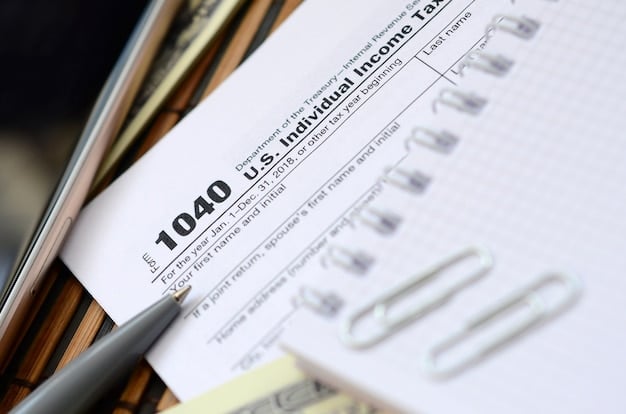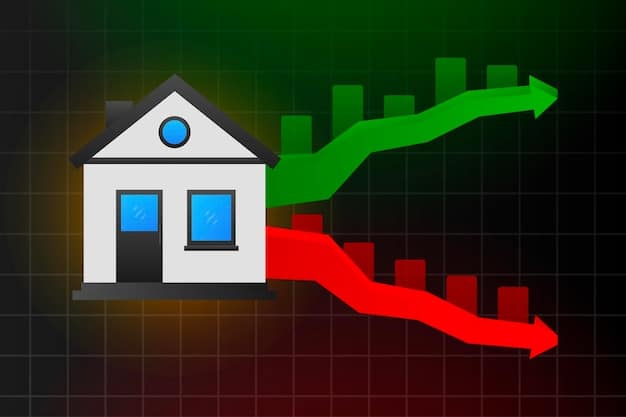Passive Income Alert: Tax Law Changes Impacting Rental Owners in 2025

The landscape of passive income for rental property owners is set to change in 2025 due to new tax laws, potentially affecting investment strategies and profitability, requiring investors to stay informed and adapt accordingly.
Are you a rental property owner looking to secure your **passive income** in 2025? Get ready! New tax law changes are on the horizon, potentially impacting your profits and investment strategies. Understanding these changes is crucial for staying ahead and maximizing your returns.
Understanding the Current Passive Income Tax Landscape
Before diving into the upcoming changes, it’s important to grasp the current tax rules surrounding passive income, especially as it relates to rental properties. Knowing where we stand now will help us better understand the impact of the new laws.
Currently, income from rental properties is generally considered passive income. This means it’s earned without the owner’s active participation, allowing for certain tax advantages and deductions. However, these advantages come with their own set of rules and regulations that need to be carefully followed.
Key Aspects of Current Rental Property Taxation
Several elements play a significant role in determining the tax liability of rental property owners. Here’s a quick rundown:
- Depreciation: This allows you to deduct a portion of the property’s cost over its useful life, reducing your taxable income.
- Operating Expenses: Costs like repairs, maintenance, insurance, and property management fees can be deducted.
- Mortgage Interest: A significant portion of your mortgage payments can be deducted, further lowering your tax burden.
Understanding these aspects is the first step in navigating the tax implications of your rental property income.

In conclusion, the current tax landscape for rental property owners involves several deductions and considerations that can significantly impact your overall financial picture. Familiarizing yourself with these aspects is essential for making informed investment decisions.
Overview of the New Tax Law Changes for 2025
Now, let’s shift our focus to the **new tax law changes** slated to take effect in 2025. These changes could potentially reshape how rental property owners approach their investments and manage their finances.
While the exact details will depend on the final legislation passed, early proposals and discussions suggest some key areas of reform. These could include alterations to depreciation rules, changes in deduction eligibility, and potential modifications to how passive income is classified.
Potential Impacts on Rental Property Owners
Here are some of the potential impacts to watch out for:
- Depreciation Adjustments: There may be changes in how quickly you can depreciate your property, potentially affecting your short-term tax savings.
- Deduction Limitations: Certain deductions that are currently available might be limited or eliminated, increasing your taxable income.
- Passive Income Redefinition: The definition of passive income itself could be modified, impacting who qualifies for certain tax benefits.
Staying informed about these potential changes will allow you to proactively adjust your strategies and minimize any negative impacts.
In conclusion, the upcoming tax law changes in 2025 have the potential to significantly alter the financial landscape for rental property owners. It’s crucial to stay informed and adapt your investment strategies accordingly to maximize your returns.
How These Changes Affect Your Passive Income Strategy
The **impact of these tax law changes** on your passive income strategy should not be underestimated. They could necessitate a re-evaluation of your investment approach and financial planning.
For example, if depreciation deductions are reduced, it could lead to higher taxable income in the short term. Similarly, limitations on expense deductions could squeeze your profit margins, requiring you to find ways to increase revenue or cut costs.
Strategies to Adapt to the New Tax Laws
Here are some strategies you can consider to mitigate the effects of these tax law changes:
- Optimize Rental Rates: Conduct market research to ensure your rental rates are competitive and maximizing your income potential.
- Control Expenses: Implement cost-saving measures without compromising the quality of your property or tenant satisfaction.
- Explore Tax-Advantaged Investments: Consider diversifying your portfolio with investments that offer tax benefits.

By proactively addressing these potential challenges, you can safeguard your passive income stream and maintain a profitable rental property business.
In conclusion, as tax laws evolve, so too must your passive income strategy. By staying informed, adapting your approach, and exploring new opportunities, you can navigate the changing landscape and continue to generate consistent returns.
Navigating Depreciation and Deductions in 2025
One of the most significant areas of potential change in the new tax laws is **depreciation and deductions**. Understanding how these elements might be affected is critical for effective tax planning.
Depreciation, as mentioned earlier, allows you to deduct a portion of your property’s cost over time. Changes in this area could impact how quickly you can recoup your investment and reduce your taxable income. Similarly, deductions for expenses like repairs, insurance, and property management can significantly lower your tax liability.
Maximizing Tax Efficiency Under the New Rules
Here are some tips on how to navigate depreciation and deductions effectively:
Stay Updated on Regulations
Changes to tax laws can be complex and nuanced. It’s important to stay current with the latest regulations and guidelines from the IRS and other relevant authorities.
Consult with a Tax Professional
A qualified tax advisor can help you understand how the new tax laws apply to your specific situation and develop a tailored tax plan.
Maintain Accurate Records
Keeping detailed records of all income and expenses will make it easier to claim deductions and ensure compliance with tax laws.
- Stay Updated on Regulations: Changes to tax laws can be complex and nuanced; stay current with the IRS guidelines.
- Consult with a Tax Professional: A qualified tax advisor can help you understand how the new laws apply to your situation.
- Maintain Accurate Records: Keep detailed records of all income and expenses to ensure compliance with tax laws.
In conclusion, careful planning and attention to detail are essential for navigating depreciation and deductions effectively under the new tax laws. By taking a proactive approach, you can minimize your tax liability and maximize your financial returns.
Planning for Long-Term Passive Income Success
To **ensure long-term passive income success** in the face of changing tax laws, it’s crucial to adopt a strategic and forward-thinking approach. This involves not only understanding the current regulations but also anticipating future changes and adapting your investment strategies accordingly.
Building a resilient passive income portfolio requires diversification, careful financial planning, and a commitment to staying informed and proactive.
Key Strategies for Long-Term Success
Consider these strategies for building a sustainable passive income stream:
- Diversify Your Investments: Don’t rely solely on rental properties; explore other passive income sources like stocks, bonds, or crowdfunding.
- Develop a Financial Plan: Create a detailed financial plan that outlines your income goals, expenses, and investment strategies.
- Regularly Review Your Portfolio: Periodically assess your portfolio’s performance and make adjustments as needed to optimize returns and manage risk.
By implementing these strategies, you can create a robust passive income stream that can withstand changing market conditions and tax regulations.
In conclusion, achieving long-term passive income success requires a strategic mindset, diversification, and a commitment to continuous learning. By taking a proactive approach, you can build a resilient portfolio that generates consistent returns for years to come.
Expert Tips for Rental Property Owners in 2025
To help you navigate the changing tax landscape, here are some **expert tips for rental property owners** in 2025. These insights can help you make informed decisions and optimize your financial outcomes.
First and foremost, it’s essential to stay informed about the specific details of the new tax laws. Consult with a tax professional to understand how these changes will affect your individual situation. Next, review your current rental rates and expense management strategies to ensure you’re maximizing your income potential.
More Expert Insights
Here are some additional tips:
Consider Energy-Efficient Upgrades
Investing in energy-efficient upgrades like solar panels, energy-efficient windows, or insulation can qualify you for tax credits or deductions.
Review Your Insurance Coverage
Make sure your insurance policies adequately cover your rental properties against potential risks like property damage, liability, and loss of rental income.
Build a Strong Tenant Relationship
Retaining good tenants can reduce turnover costs and ensure a consistent income stream.
- Consider Energy-Efficient Upgrades: Investing in upgrades like solar panels can qualify you for tax credits or deductions.
- Review Your Insurance Coverage: Ensure your policies adequately cover your properties against potential risks.
- Build a Strong Tenant Relationship: Retaining good tenants reduces turnover costs and ensures consistent income.
By following these expert tips, you can position yourself for success in the rental property market and navigate the challenges of the new tax laws with confidence.
In conclusion, staying informed, optimizing your property management strategies, and seeking expert advice are crucial for success as a rental property owner in 2025. By taking a proactive approach, you can maximize your income and minimize your tax liabilities.
| Key Aspect | Brief Description |
|---|---|
| 💡 Tax Law Changes | New tax laws in 2025 may impact rental income strategies. |
| 🏡 Rental Rates | Optimizing rental rates ensures maximizing potential income. |
| 💰 Expense Control | Manage expenses to maintain profitability under new rules. |
| 🛡️ Insurance | Adequate insurance coverage protects against potential risks. |
Frequently Asked Questions (FAQ)
▼
The changes may involve depreciation adjustments, deduction limitations, and modifications to the definition of passive income, potentially affecting rental property owners’ tax liabilities.
▼
Optimize rental rates, control expenses, explore tax-advantaged investments, and consult with a tax professional to navigate the impact of these changes effectively.
▼
Depreciation allows deducting a portion of your property’s cost over time. Changes could impact how quickly you recoup investments and reduce taxable income.
▼
Long-term planning ensures a resilient passive income portfolio through diversification and continuous adjustments to optimize returns and manage risk effectively.
▼
Staying informed, considering energy-efficient upgrades, reviewing insurance coverage, and building strong tenant relationships are crucial for success and financial optimization.
Conclusion
As we look ahead to 2025, it’s clear that the tax landscape for rental property owners is poised for significant change. By staying informed, adapting your strategies, and seeking expert advice, you can navigate these challenges and continue to build a successful passive income stream. Proactive planning is key to maximizing your financial outcomes and securing your long-term investment goals.





